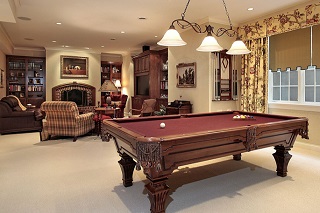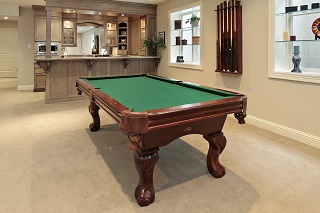
Equipment Specifications for Pool and Billiard tables BCA
Pool Table Sizes
3 1/2′ x 7′, 4′ x 8′, and 4 1/2′ x 9′ with the Play Area measuring twice as long as it is wide (± 1/8″) from the cloth-covered nose of the cushion rubber to the opposite cushion rubber. 4 1/2′ x 9′ tables with a Play Area of 50″ x 100″ is the recognized size for professional tournament play. TABLE BED HEIGHT: The table bed playing surface, when measured from the bottom of the table leg, will be 29 1/4″ minimum to 31″ maximum. – Info from Chicago Pool Table Movers

Pocket Openings and Measurements (Cloth Covered Rails)
Pocket openings are measured from tip to tip of the opposing cushion noses where direction changes into the pocket. This is called the mouth.
Corner Pocket: Mouth Between 4 7/8″ minimum to 5 1/8″ maximum
Side Pocket: Mouth Between 5 3/8″ minimum to 5 5/8″ maximum
The angle at the corner pocket entrance on each side of the pocket is 142o (±1o).
The angle at the side pocket entrance on each side of the pocket is 103o (± 2o).
Vertical Pocket Angle: 12o minimum to 15o maximum. – Chicago Pool Table Movers
Shelf: The shelf is measured from the center of the imaginary line that goes from one side of the mouth to the other where the nose of the cushion changes direction to the center of the vertical cut of the slate pocket radius.
Corner Pocket:
1 5/8″ minimum to 1 7/8″ maximum
Side Pocket: 0″ minimum to 3/8″ maximum
Drop Point Slate Radius: The pocket radius measured from the vertical cut of the slate to the playing surface.
Drop Point Slate Radius 1/8″ radius min. to 1/4″ radius max.
Billiard Playing Bed / Playfield
The playing surface must be capable, either by its own strength or a combination of its strength and that of the table base frame, of maintaining an overall flatness within ± .020″ lengthwise and ± .010″ across the width. Further, this surface should have an additional deflection not to exceed .030″ when loaded with a concentrated static force of 200 pounds at its center. All slate joints must be in the same plane within .005″ after leveling and shimming.

The bed must be covered with a billiard fabric, the major portion of which is made of wool, with proper tension to avoid unwanted ball roll-off. – Chicago Pool Table Movers. It is recommended that professional tournament size tables have a three-piece set of slate with a minimum thickness of 1″ and a wooden frame of at least 3/4″ attached to slate. BCA will sanction tournament play on home and coin-operated tables with one-piece slate providing the Play Area requirements are met.
All playing surfaces must be solidly secured to the base frame with screws or bolts.
Billiard Cushion
Cushions should react so that they conform under controlled conditions to the three cushion angles prescribed in the “diamond” (or site) system showing in the diagram on page 161 of Billiards: The Official Rules and Records Book to ± 1 ball width. The speed of the table cushions should be such that placement of a ball on the head spot, shooting through the foot spot, using center ball English, with a level cue and firm stroke, the ball must travel a minimum of 4 to 4 1/2 lengths of the table without jumping. – Chicago Pool Table Movers
Pool Ball Specifications
Molded and finished in a perfect sphere in the following weight and diameter:
Pocket Billiard Balls
Weight: 5 1/2 to 6 oz.
*Diameter: 2 1/4″ *Diameter tolerance of (plus or minus).005″
Pool Cue Specifications
Player may bring a maximum of 3 cue sticks to a match.
Width of tip: no minimum / 14 mm maximum
Weight: no minimum / 25 oz. maximum
Length: 40 inches minimum / no maximum
The cue tip may not be of a material that can scratch or damage the addressed ball. The cue tip on any stick must be composed of a piece of specially processed leather or other fibrous or pliable material that extends the natural line of the shaft end of the cue and contacts the cue ball when the shot is executed. The ferrule, if of a metal material, may not be more than 1 inch in length.